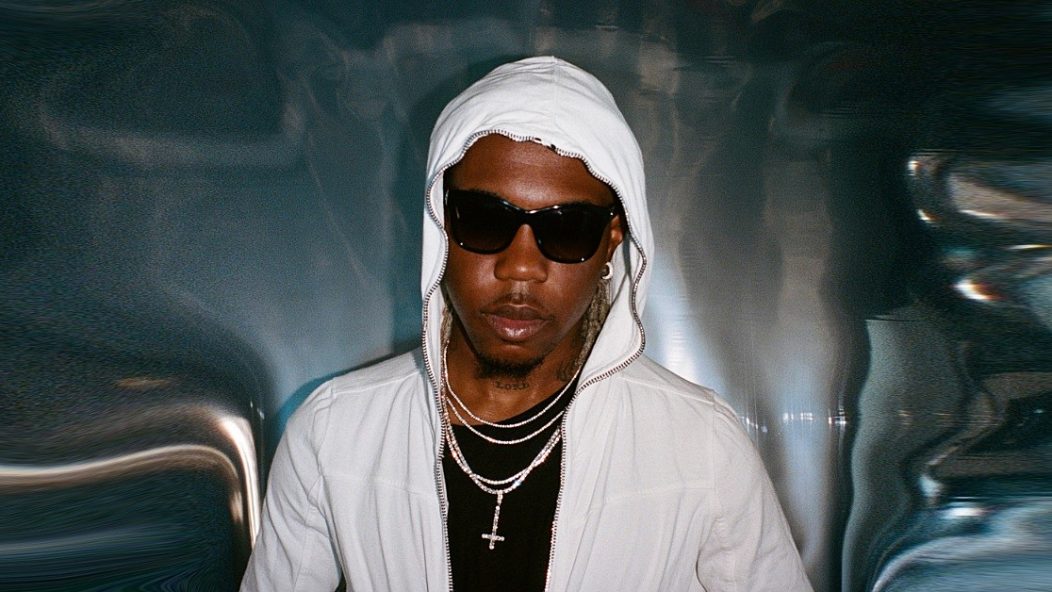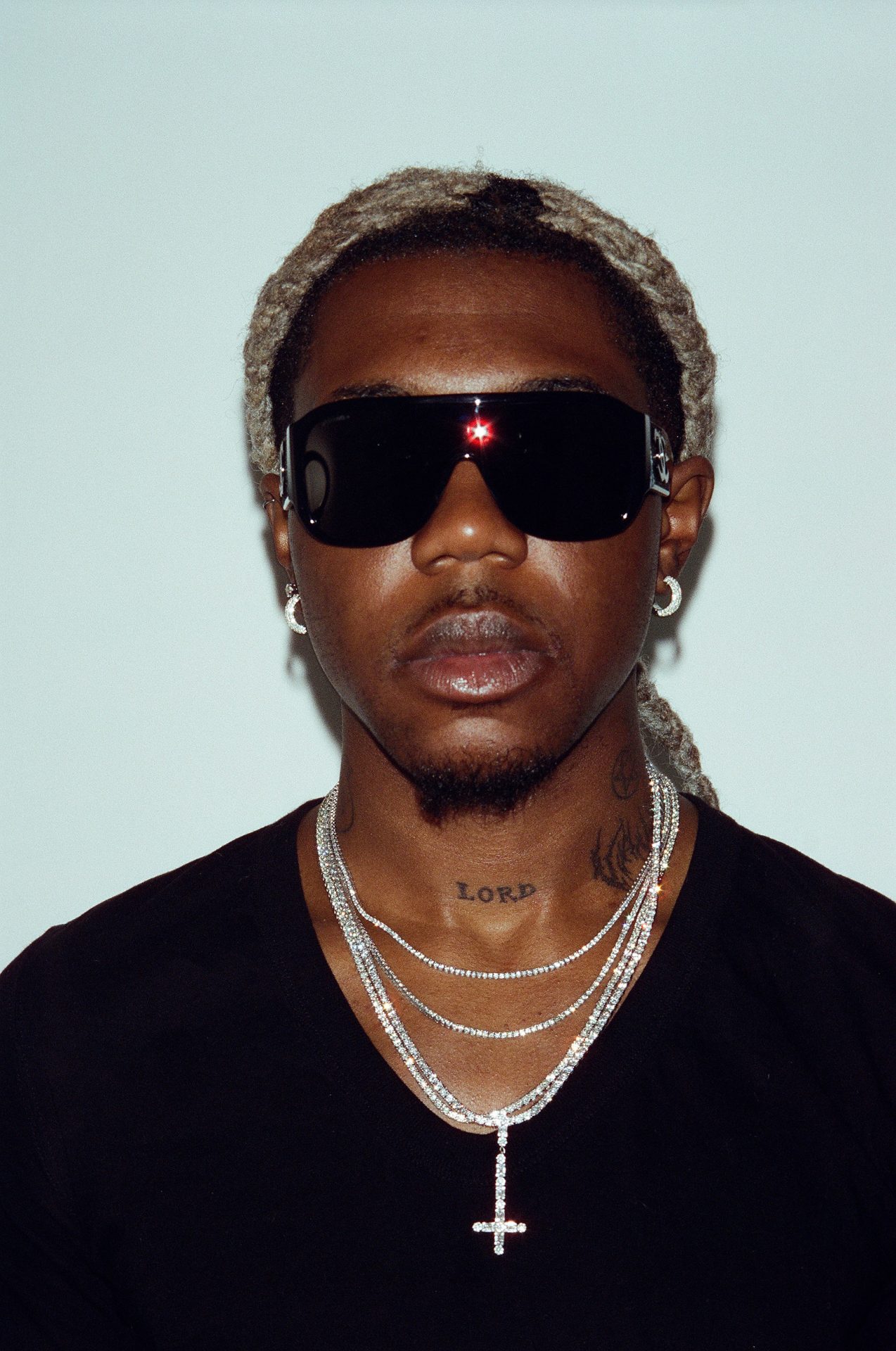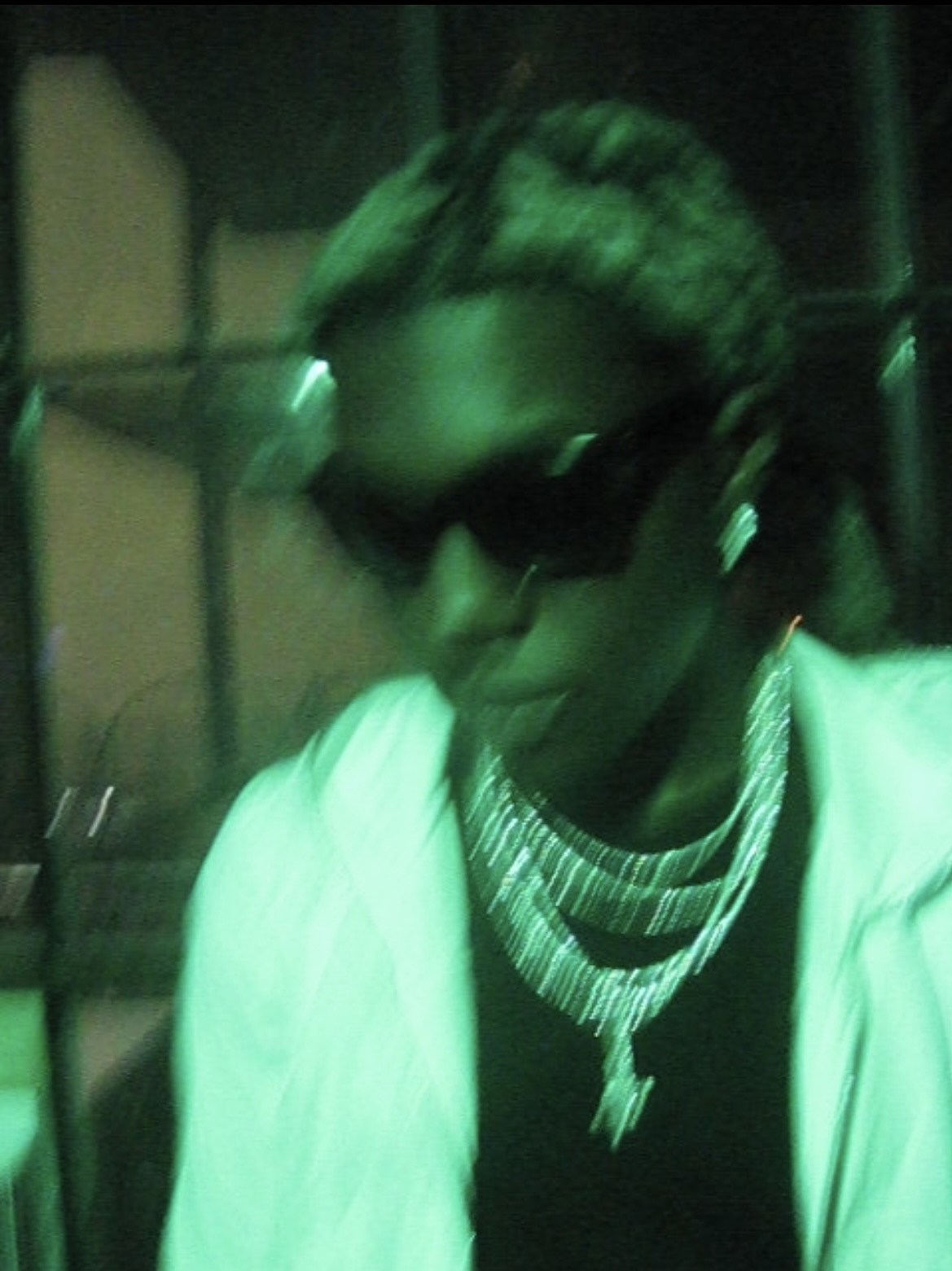
With If Looks Could Kill, Destroy Lonely made the ultimate “sonic horror movie”
Destroy Lonely appears in our 2023 summer issue, which you can buy here.
In the artwork for Destroy Lonely’s new album, If Looks Could Kill, the 21-year-old’s face is obscured as he stands in a field of grass. His head is tilted downward, and he’s wearing a black jumpsuit, matching gloves and a brimmed hat. In the GIF version, his blond locs sway across his chest, propelled by his right arm, which is swinging an orange ax back and forth like a pendulum. A red flash of light punctuates the subtle movement.
“If I were to explain what my album is for the world to understand, I like horror movies, and this ain’t nothing but sonic horror movies,” he says on the Monday before the record is released. When he shares music, he says, it’s not enough for people to just listen to it. He wants fans to inhabit the world he’s creating throughout the rollout, including the photos and music videos.
Read more: 15 absolute best A24 horror movies, ranked
Centered around three chords on an electric guitar, the album’s title track juxtaposes lyrics about a luxury wardrobe with dark references to violence. “I’m walkin’ through hell, I got an FN loaded up with a laser,” the self-proclaimed “fashion demon” raps at one point. He closes the song with a blood-soaked statement: “If looks could kill, that makes every day Halloween.”
Fans of Lonely know this is all a part of his brand. On the 2022 mixtape NO STYLIST, the rapper leverages similarly dark cover art and rhymes about wrapping someone up and turning them into a mummy (“PRSSURE”), makes sly references to hanging with Bloods with the help of a vampire metaphor (“BERGDORF”) and claims a girl is eating him up “like a zombie” (“LNLY”).
When asked to describe his fascination with horror as a genre, he begins to respond honestly and then remembers he’s participating in an interview, turning on the marketing charm. “If I’m going to give an answer that I know people want to hear… I’m a person who is going to say or do whatever the fuck I feel, whether it’s shocking or people like it or don’t like it,” he says. “You watch a horror movie, somebody is getting their head cut off, people are having sex [and] cussing. It’s a whole bunch of shit that you’re like, ‘Damn, this shit is insane.’ Who gives a fuck? People might call it breaking the rules [or] inappropriate, but they’re doing exactly what the fuck they want to do.”
Despite making and publicly releasing music for a third of his life, Destroy Lonely is still very much a mystery to most listeners. That hasn’t stopped them from gravitating to his songs. Signing to Playboi Carti’s Opium label (an Interscope imprint) in 2021 has both amplified Lonely’s music (he’s currently streamed by more than 3 million listeners per month on Spotify) and strengthened his enigmatic, vampy persona. Where last year’s NO STYLIST landed him on several “artists to watch” lists, If Looks Could Kill capitalizes off that momentum and shows that, after seven years of making music, he’s finally hitting his stride as a rapper.
If you asked Lonely to describe himself, he’d say that he hates most labels. Recently, he told Complex that he doesn’t like being referred to as an “underground rapper” or boxed in with the group of artists who first made waves on SoundCloud. He doesn’t seem terribly interested in overanalyzing his artistry. His raps are off the dome, meant to capture a specific thought or feeling from a moment in time. When that moment is gone, it’s time to record something new.

[Photo by Paula Busnovetsky / Photo editor: Justin Scott Rivera]
Bobby Sandimanie III, whose stage name came from a destructive dependency on pills at a young age and a general inclination toward isolation, didn’t always have a way with words. Rapping provided an outlet for the otherwise reclusive kid to express himself. “I was able to say exactly what I wanted with no restrictions,” he says. For early, unreleased songs, he’d jot down lyrics as he was figuring out his style. Eventually, he began strictly recording freestyles, in the vein of Lil Wayne and Young Thug.
A Decatur, Georgia native who eventually moved to the southside of Atlanta to live with his grandmother, Lonely’s teenage years in the late 2010s coincided with the release of breakout projects from local rappers such as Lil Yachty (Lil Boat) and 21 Savage (Savage Mode with Metro Boomin). Atlanta’s hip-hop scene was home to mainstream successes like Future, while the underground was making space for rappers like Young Nudy. And, of course, Playboi Carti rose to prominence during this time, releasing the critically acclaimed Die Lit in 2018. There’s a direct link between Carti’s music and the early work of his eventual Opium-signee Lonely. If Looks Could Kill is his most successful attempt at distancing himself from those comparisons.
Lonely, whose father was once signed to Ludacris’ Disturbing Tha Peace and raps as I-20, cautions against crediting his sound to any one influence. “I’m not directly influenced by any specific artist,” he says. “The culture of [Atlanta] and the music and all that shit really inspired me.”
As a teenager living with his grandmother, Lonely began recording music with a cheap microphone in a makeshift home studio. His high school (which he declined to name) hosted a class on music production, offering him a chance to gain experience using studio equipment and Pro Tools. “From there, I was really able to learn more and teach myself how to record myself better,” he says. By the time he was 14, he was uploading his music to SoundCloud, sometimes racking up 10,000 streams in a month’s time. It was the validation the teen needed to confirm he was onto something. “If you ask me, I’ve never made a bad song, just because I always tried,” he adds, before providing a clarification. “Of course, [now] there’s shit that’s way better than the shit back then.”
Released in 2019 when he was 17 years old, the song “Bane” provides a glimpse into the rapper’s style in its early stages. If the 4ME production feels like it’s straight out of a simulation, Lonely’s vocals dip in and out of vocal ranges as if he’s trying to escape the track. Lonely admits he doesn’t like when people say his music sounds like a video game, but listening to the repetitive synth melody in the song, it’s easy to see why people make the comparison.

[Photo by Paula Busnovetsky / Photo editor: Justin Scott Rivera]
In less than five years, fans have watched Lonely home in on his style through a near-constant stream of new releases. Where his 2020 mixtape </3 featured the rager track “F.U.N” and the cinematic “Dover Street Market,” NO STYLIST — his first under Carti’s Opium — signaled growth both sonically and in terms of creative direction. For the artwork, an oval-shaped spotlight shines upon the rapper’s chest but stops short of revealing his face. A majority of the cover is pitch black, signaling the dark tone of the music to come and engulfing the rapper in a shroud of mystique that he’s yet to take off. “Damn, I done switched up my swag/I done hopped in my bag, know these n*ggas ain’t on that,” he raps confidently on opener “JETLGGD.” On the title track, he turns bragging about not having a stylist into an anthem about indulging in hard-earned luxuries (“Told my folks I’m gettin’ rich, it ain’t no way I’m washin’ dishes,” he raps). NO STYLIST features 19 songs and only one feature, fellow Opium artist and friend Ken Carson, but succeeds in solidifying Lonely as one of the most promising new rappers out of Atlanta.
He proves himself further with If Looks Could Kill, which serves as his official debut album. Previously, it could sometimes feel like Lonely was competing with the production for the attention of listeners. He’s unequivocally the focal point of this project. On “fly sht” and “raver,” the stories of his rock star, drug-fueled lifestyle are placed atop wailing guitar lines. Throughout the album, Lonely’s raps are as grand as his new lifestyle. He’s on G6 planes and bragging about his jewelry (“which way”) and has a new house for months before he’s able to find time to sleep in it (“new new”).
Lonely spends almost every night in the studio, arriving around 10 or 11 p.m. and listening to previously recorded tracks before delving into new material. It’s not uncommon for him to be with Carson (who is in a nearby studio room when we speak) or the producer Clayco, who has helmed a number of tracks for the rapper throughout his career.
“Every album I’ve ever made was made by my friends. That’s a part of my process. I make the music and share it with everyone around me. If they fuck with it, that’s how I know the world is going to fuck with it. Within the recording process, it’s all communal,” he says.
Oftentimes when Lonely is in the studio with Clayco, he’s humming a melody or sharing a reference around which the producer will construct a beat. There’s a synergy between the two and an ease in the studio that has made recording over the years feel seamless. “He can translate everything that I’m thinking of sonically into a beat, and that’s why I fuck with him,” Lonely says.
Clayco describes their early studio sessions as unfolding “like a dream,” adding that the two had been working on music together for about a year before they ever met in person. “There wasn’t really much talking. We just always connected musically,” he says. “Over the years, he’s really become his own artist. He really has his own swag. The beats he uses from me are the perfect duo. I inspire him, and he inspires me. When I make a beat, I can hear him rap on it before I send it to him.”
“Anyone who I’m closely attached with, I’ve known in real life for years,” Lonely says. “That’s why I don’t like to dip and dab into the whole rapper shit or to meet other people or put [them] on my projects or [anything]. I feel like I’ve got everything I need in my life with the people around me.” Carson, Lonely says, was a friend before the two signed to the same label. As teenagers, they bonded over couch hopping, smoking weed and daydreaming about someday finding success with their music. Soon, the two plan to release a joint project together.
Hearing Lonely speak of his community feels like finally seeing glimpses of him peek out from beyond the persona he’s created for himself. Even if he still has moments of feeling alone — a completely normal and common feeling — he’s far from the reserved, lonely kid he used to be.










